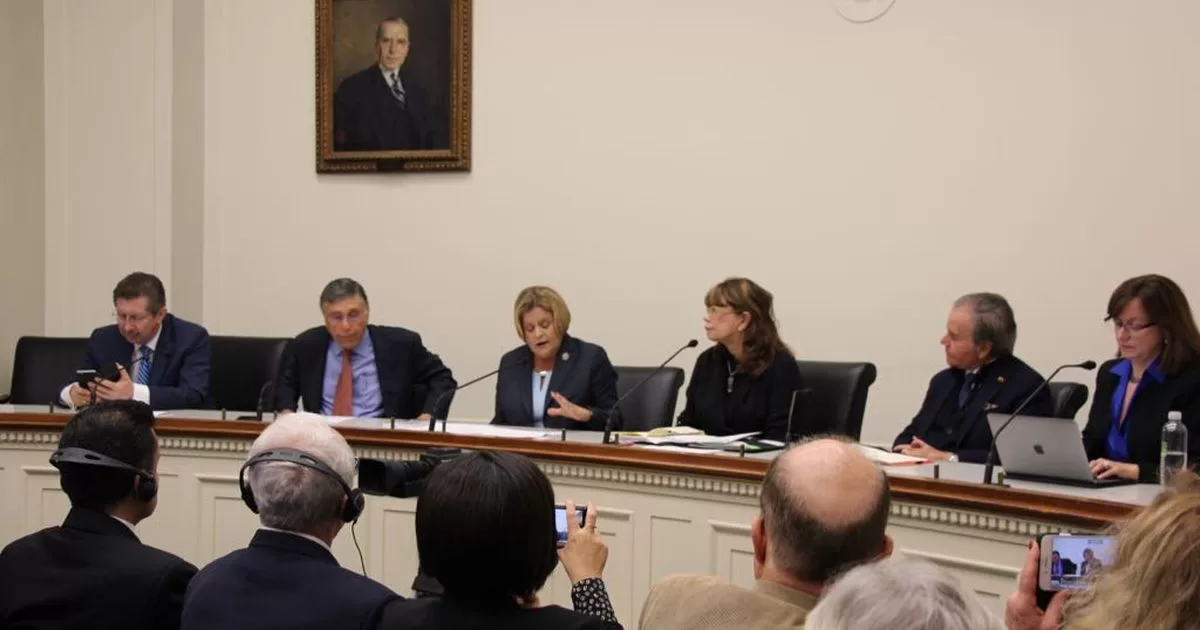Regarding this, the Interamerican Institute for Democracy held the “Elections in the Americas 2024” forum, in which a panel of experts analyzed the contexts and scenarios in which each of these elections will take place.
The interventions began with Eduardo Gamarra, who analyzed the electoral situation in the US. He was followed by: Damián Merlo, who spoke about El Salvador; Carlos Moreno, was in charge of Panama; Diego Arria, who spoke about the Dominican Republic; Ricardo Israel, who referred to Mexico; Luis Fleishman, who explained the situation in Uruguay; Enrique Aristeguieta, who spoke about the difficult situation in Venezuela; and finally, Carlos Sánchez Berzaín, who presented the conclusions.
USA
Eduardo Gamarra, professor of Politics and International Relations at Florida International University, highlighted that in the US elections the immigration and border issue will dominate the discourse of the electoral campaign, beyond the economic results and the international positioning that President Joe Biden’s government has had.
“The immigration and border issue has awakened a nationalist sentiment and the Republicans are in control of this issue. This issue will define the result, beyond Biden’s economic positioning and Biden’s international positioning,” he said.
Gamarra highlighted that in recent years there has been a change in the traditional vote of Democrats. He gave as an example that now a “significant component” of Hispanics sees migration as a “threat” and called for reflection on why “the “African-American is no longer a safe vote for Democrats.”
Likewise, Gamarra indicated that after the victory of former President Donald Trump in the Iowa primaries, it seems that it is already taken for granted that he will be the Republican candidate. Given this scenario, Gamarra highlighted the “extraordinary electoral and communication machinery” that Trump has, which “has no comparison with the Democrats’ inability to communicate their achievements.”
“Biden has launched his campaign based on Trump being a threat to democracy… But it is not effective. It is an abstract debate and it is not a message that reaches the base,” he explained.
He added that it is currently clearer that Trump “appeals to the working class,” while Democrats have diverse currents in the party, such as environmentalists, progressives, and those who oppose war. “All of these groups can be assumed to vote for Biden.”
Gamarra indicated that polls have shown that the Democratic Party has lost support among unions, Hispanics and African Americans.
The Savior
Damián Merlo, founder of DMM Consulting, a government relations firm, highlighted that El Salvador’s electoral panorama is marked by Nayib Bukele’s high popularity index (90%, according to surveys). According to Merlo, the Salvadoran population is “very happy” with Bukele’s management “because he feels that democracy works after so many years of armed and political conflict.”
Merlo assured that Bukele “is very well on his way to re-election” and pointed out that the president’s popularity is not only due to his security policies, but also because his management has covered other areas such as education and health.
Merlo highlighted that to date more than 100,000 Salvadorans abroad have cast their vote in the process that began a few weeks ago and will conclude with the elections on February 2.
Likewise, Merlo indicated that Bukele’s party, Nuevas Ideas, could obtain almost all of the deputies in the elections.
Panama
Carlos Moreno highlighted that the electoral climate in Panama is impacted by the rejection, by social sectors, of a mining project that was going to contribute 5% to the GDP, which has caused a budget cut for the government.
In these elections, two former presidents intend to run again in the presidential race. This is Ricardo Martinelli, who has favoritism according to polls, and former president Martín Torrijos.
Moreno highlighted that one of the problems that arises in the elections is the low level of governability with which the presidents come to power in the country. “There are eight candidates and if Martinellii wins he will do so with a little more than 30% at most, he takes office with 70% of the country against. The possibility of making the changes is compromised,” he said.
In his opinion, the issues that will dominate the campaign will be the loss of income from the mining project, the loss of water recorded by the Panama Canal and the bankruptcy of the Social Security Fund.
However, Moreno highlights as something positive the fact that the eight candidates are aligned with favoring the generation of capital and investment in the country.
Dominican Republic
Diplomat Diego Arria, member of the Interamerican Institute for Democracy, highlighted that the elections take place in a country that is democratically consolidated, thanks to the fact that the private sector has invested internally and the Dominican Republic has managed to position itself as the seventh economy in Latin America.
Arria positively assessed that this consolidation has occurred despite the country’s context in relation to its neighbor Haiti “which weighs on the economy and security.”
Mexico
Ricardo Israel, lawyer and Political Scientist – former presidential candidate in Chile, highlighted for his part that Mexico’s relationship with the United States continues to be one of the most important issues for any Mexican president and that they are related to drug trafficking and corruption.
“Mexico has replaced Colombia in terms of violence… The cartels have taken over the southern border. Without the demand for drugs from the US, violence and corruption would not exist. The weapons with which people kill people in Mexican streets come from the US” , said.
Israel also highlighted that in these elections, Mexico will have a female president for the first time, with Claudia Sheinbaum and Xóchitl Gálvez competing.
Regarding the issue of illegal migration, Israel highlighted the security problems that affect Mexico due to this situation.
In his opinion, the relationship with the United States lacks a State policy and purpose.
Uruguay
Luis Fleishman, member of the Interamerican Institute for Democracy, explained for his part that the Uruguayan elections take place in a context of corruption and espionage scandals in which members of Luis Lacalle Pou’s government were involved, which caused the the president’s popularity at 45%.
Venezuela
Enrique Aristiguieta, who is also a member of the board of directors of the Interamerican Institute for Democracy, spoke about the panorama of electoral uncertainty in the Caribbean country, where the date of the presidential elections that must be held in the second half of 2024 is not yet known. Aristiguieta He highlighted the unity of the opposition groups around the candidacy of María Corina Machado, who won the internal opposition primaries last October.
“If there are elections, the opposition will win. María Corina Machado is in front in all the polls, in the event that there is an election. But I do not dare to assure that that will happen. It would be a surprise if the government accepted to attend free elections and agree to hand over power if he loses. I find it difficult because the communists and especially the people of Cuba, of Chávez, do not believe in democracy. I do not make optimistic calculations about what can happen in Venezuela”, he pointed.
bad governments
The last turn in the forum’s interventions was had by the executive director of the Interamerican Institute for Democracy, Carlos Sánchez Berzaín, who pointed out that in 2024 democracy will continue to strengthen on the American continent and highlighted that of the seven elections that are going to be held, six will occur. in consolidated democracies, such as: the USA, Panama, Mexico, El Salvador, Uruguay and the Dominican Republic. Meanwhile, only one of them will be in a dictatorship, like that of Venezuela.
However, Sánchez Berzaín warned that governability is currently at risk in Latin America because what the presidential system is producing in the region are minority governments.
“Governments come to power that do not have the capacity to govern, because they become presidents when they are the first minority, they do not have a majority in the legislature and they do not have the capacity to form a government of national unity, that is why they are bad governments,” he said.
Source: WRITING


